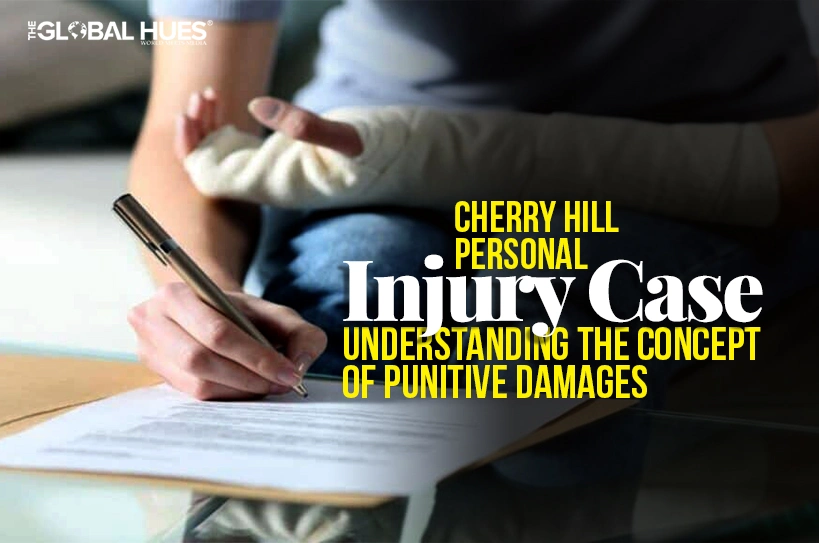Cherry Hill, located in Camden County, New Jersey, is a community known for its picturesque parks, lively shopping districts, and family-oriented events. As a thriving suburban area, it offers a vibrant lifestyle for its residents and visitors alike. However, even in a community as welcoming as Cherry Hill, accidents and disputes can occur, leading individuals to seek legal recourse for injuries they have suffered. When pursuing such cases, personal injury lawyers in Cherry Hill can provide crucial assistance in navigating the complex legal landscape. One important aspect they may address is the concept of punitive damages, which plays a key role in certain personal injury claims.
What Are Punitive Damages?
Punitive damages, also referred to as “exemplary damages,” are a form of compensation awarded by the court to punish the defendant rather than to compensate the plaintiff. They are typically granted when the defendant’s actions are considered especially reckless, malicious, or fraudulent. The intention is to deter such behavior in the future by making an example of the defendant.
Punitive damages are not automatically awarded in every personal injury case. The court has the discretion to decide whether the defendant’s actions warrant this type of financial penalty, depending on the severity and intent of the wrongdoing.
The Purpose of Punitive Damages
While compensatory damages focus on reimbursing the victim for their losses—such as medical bills, lost wages, and pain and suffering—punitive damages serve a different purpose. They are designed to:
- Punish the Wrongdoer – If the defendant acted with egregious misconduct or deliberate disregard for others’ safety, the court may impose punitive damages to hold them accountable.
- Set an Example – Punitive damages serve as a warning to others. By financially punishing those who engage in harmful or fraudulent behavior, the court hopes to prevent similar acts in the future.
- Promote Justice – For some plaintiffs, receiving punitive damages provides a sense of justice beyond mere compensation. It reassures them that the defendant has been properly penalized for their actions.
When Are Punitive Damages Awarded?
Not every personal injury case in Cherry Hill qualifies for punitive damages. Generally, they are awarded in rare instances where the defendant’s conduct is deemed especially harmful. Here are a few situations where punitive damages might be considered:
- Intentional Harm: If the defendant intentionally caused harm, such as in cases of assault or fraud.
- Gross Negligence: When the defendant’s actions demonstrate a blatant disregard for the safety of others. For instance, a drunk driver who causes a serious accident might be subject to punitive damages.
- Reckless Conduct: In cases where the defendant’s actions were extremely reckless, punitive damages may be appropriate. An example could be a company ignoring safety regulations, resulting in harm to consumers.
- Corporate Misconduct: Large corporations that prioritize profit over safety, leading to significant harm, may face punitive damages as a way to penalize and prevent future misconduct.
Limits and Caps on Punitive Damages
Punitive damages are not unlimited, and there are regulations in place to prevent excessive awards. Many states, including New Jersey, have set specific caps or guidelines that courts must follow when deciding the amount of punitive damages to award.
In New Jersey, punitive damages are typically capped at five times the amount of compensatory damages or $350,000, whichever is greater. However, the court may adjust these limits in certain situations, particularly if the defendant’s actions are deemed extremely harmful.
The Process of Proving Punitive Damages
In a personal injury case, the burden of proof for punitive damages is higher than for compensatory damages. While compensatory damages are awarded based on the preponderance of evidence, punitive damages must be proven with “clear and convincing evidence.” This means the plaintiff must show that the defendant’s conduct was not only negligent but also intentional or highly reckless.
A seasoned personal injury lawyer in Cherry Hill can help you navigate this process, gathering the necessary evidence and presenting a strong case to convince the court that punitive damages are justified.
How Punitive Damages Are Calculated
The calculation of punitive damages depends on several factors, including:
- Severity of the Conduct: The more severe or intentional the wrongdoing, the higher the punitive damages might be.
- Defendant’s Financial Standing: Courts will often consider the financial condition of the defendant when determining punitive damages. A larger company or wealthy individual may face higher punitive damages compared to a defendant with fewer financial resources.
- Deterrence: The court aims to set punitive damages at a level that deters the defendant and others from engaging in similar misconduct in the future.
Can Punitive Damages Be Reduced or Reversed?
In some cases, defendants may appeal the amount of punitive damages awarded, arguing that they are excessive or unfair. Courts may reduce or reverse punitive damages if they find that the award exceeds legal limits or that the conduct did not meet the standard for punitive damages. However, once punitive damages are awarded, they are rarely overturned without significant legal justification.
Conclusion
Punitive damages play a vital role in the personal injury legal system, particularly in cases involving intentional harm or gross negligence. They not only punish wrongdoers but also serve as a deterrent to others, promoting safer and more responsible behavior. If you believe that your personal injury case in Cherry Hill may warrant punitive damages, consulting with a knowledgeable personal injury lawyer in Cherry Hill is essential to ensure you understand your rights and options.
Understanding the concept of punitive damages and how they are awarded can make a significant difference in your case, offering a path to both compensation and justice.
*The information in this article does not necessarily reflect the views of The Global Hues. We make no representation or warranty of any kind, express or implied, regarding the accuracy, adequacy, validity, reliability, availability or completeness of any information in this article.*




